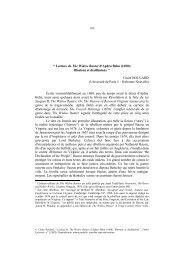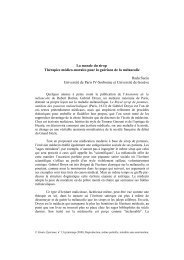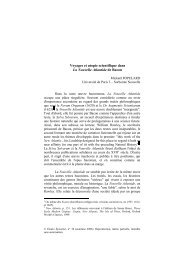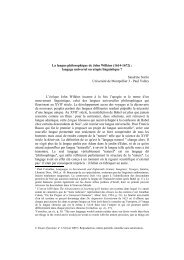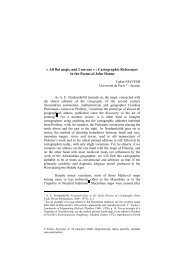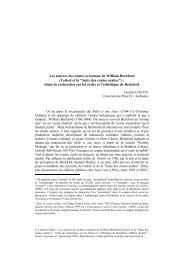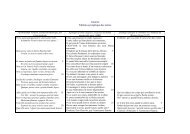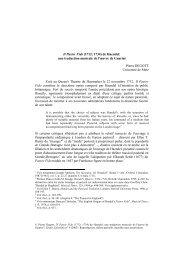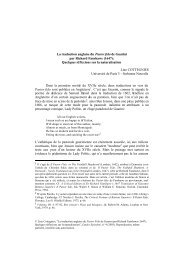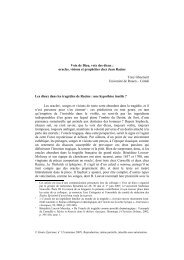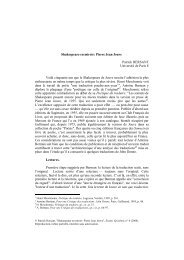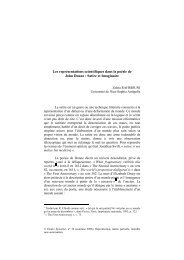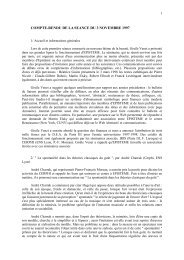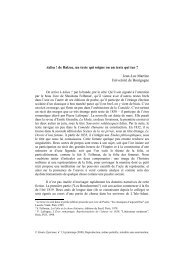Act II, scene i Enter [the] Duke, three Courtiers, and [the] executioner ...
Act II, scene i Enter [the] Duke, three Courtiers, and [the] executioner ...
Act II, scene i Enter [the] Duke, three Courtiers, and [the] executioner ...
Create successful ePaper yourself
Turn your PDF publications into a flip-book with our unique Google optimized e-Paper software.
44<br />
The Old Law<br />
<strong>Act</strong> <strong>II</strong>, <strong>scene</strong> i<br />
<strong>Enter</strong> [<strong>the</strong>] <strong>Duke</strong>, <strong>three</strong> <strong>Courtiers</strong>, <strong>and</strong> [<strong>the</strong>] <strong>executioner</strong>.<br />
DUKE<br />
Executioner!<br />
EXECUTIONER<br />
My lord.<br />
DUKE<br />
How did old Diocles take his death<br />
EXECUTIONER<br />
As weeping brides receive <strong>the</strong>ir joys at night, my lord,<br />
With trembling yet with patience.<br />
DUKE<br />
Why, ’twas well.<br />
FIRST COURTIER<br />
Nay, I knew my fa<strong>the</strong>r would do well, my lord,<br />
Whene’er he came to die. I’d that opinion of him<br />
Which made me <strong>the</strong> more willing to part from him.<br />
He was not fit to live in <strong>the</strong> world,<br />
Indeed, any time <strong>the</strong>se ten years, my lord,<br />
But I would not say so much.<br />
DUKE<br />
No! You did not well in it,<br />
For he that’s all spent is ripe for death at all hours,<br />
And does but trifle time out.<br />
FIRST COURTIER<br />
Troth, my lord,<br />
I would I had known your mind nine years ago.<br />
DUKE<br />
Our law is fourscore years because we judge<br />
Dotage complete <strong>the</strong>n, as unfruitfulness<br />
In women at <strong>three</strong>score. Marry, if <strong>the</strong> son<br />
Can within compass bring good solid proofs<br />
Of his own fa<strong>the</strong>r’s weakness <strong>and</strong> unfitness<br />
© Études Épistémè, n° 11 (printemps 2007). Reproduction, même partielle, interdite sans<br />
autorisation.
45<br />
Antoine Ertlé<br />
To live or sway <strong>the</strong> living, though he want five<br />
Or ten years of his number, that’s not it;<br />
His defect makes him fourscore <strong>and</strong> ’tis fit<br />
He dies when he deserves, for every act<br />
Is in effect <strong>the</strong>n, when <strong>the</strong> cause is ripe.<br />
SECOND COURTIER<br />
An admirable prince! How rarely he talks!<br />
Oh, that we’d known this, lads! What a time did we endure<br />
In two-penny commons, <strong>and</strong> in boots twice vamp’d!<br />
FIRST COURTIER<br />
Now we have two pairs 1 a week, <strong>and</strong> yet not thankful;<br />
’Twill be a fine world for <strong>the</strong>m, sirs, that come after us.<br />
SECOND COURTIER<br />
Ay, <strong>and</strong> <strong>the</strong>y knew it.<br />
FIRST COURTIER<br />
Peace! Let <strong>the</strong>m never know’t.<br />
THIRD COURTIER<br />
A pox, <strong>the</strong>re be young heirs will soon smell’t out.<br />
SECOND COURTIER<br />
’Twill come to ’em by instinct, man. May your Grace<br />
Never be old, you st<strong>and</strong> so well for youth.<br />
DUKE<br />
Why now, methinks our court looks like a spring;<br />
Sweet, fresh, <strong>and</strong> fashionable, now <strong>the</strong> old weeds are gone.<br />
FIRST COURTIER<br />
’Tis as a court should be:<br />
Gloss <strong>and</strong> good clo<strong>the</strong>s, my lord, no matter for merit;<br />
And herein your law proves a provident act, my lord,<br />
When men pass not <strong>the</strong> palsy of <strong>the</strong>ir tongues,<br />
Nor colour in <strong>the</strong>ir cheeks.<br />
DUKE<br />
But women by that law should live long,<br />
For <strong>the</strong>y are ne’er past it.<br />
1 two pairs] Q (two paire).<br />
© Études Épistémè, n° 11 (printemps 2007).
46<br />
The Old Law<br />
FIRST COURTIER<br />
It will have heats though, when <strong>the</strong>y see <strong>the</strong> painting<br />
Go an inch deep in <strong>the</strong> wrinkle, <strong>and</strong> take up<br />
A box more than <strong>the</strong>ir gossips. But for men, my lord,<br />
That should be <strong>the</strong> sole bravery of a palace,<br />
To walk with hollow eyes <strong>and</strong> long white beards,<br />
As if a prince dwelt in a l<strong>and</strong> of goats;<br />
With clo<strong>the</strong>s as if <strong>the</strong>y sat upon <strong>the</strong>ir backs on purpose<br />
To arraign a fashion, <strong>and</strong> condemn it to exile;<br />
Their pockets in <strong>the</strong>ir sleeves, as if <strong>the</strong>y laid<br />
Their ear to avarice <strong>and</strong> heard <strong>the</strong> devil whisper!<br />
Now ours lie downward, here, close to <strong>the</strong> flank,<br />
Right spending pockets, as a son’s should be<br />
That lives in <strong>the</strong> fashion, where our diseased fa<strong>the</strong>rs,<br />
Would with <strong>the</strong> sciatica <strong>and</strong> aches,<br />
Brought up your pan’d hose first, which ladies laughed at,<br />
Giving no reverence to <strong>the</strong> place, lie ruined.<br />
They love a doublet that’s <strong>three</strong> hours a-buttoning,<br />
And fits so close makes a man groan again<br />
And his soul mutter half a day. Yet <strong>the</strong>se are those<br />
That carry sway <strong>and</strong> worth; pricked up in clo<strong>the</strong>s,<br />
Why should we fear our rising<br />
DUKE<br />
You but wrong<br />
Our kindness <strong>and</strong> your own deserts to doubt on it.<br />
Has not our law made you rich before your time<br />
Our countenance <strong>the</strong>n can make you honourable.<br />
FIRST COURTIER<br />
We’ll spare for no cost, sir, to appear worthy.<br />
DUKE<br />
Why, you’re in <strong>the</strong> noble way <strong>the</strong>n, for <strong>the</strong> most<br />
Are but appearers; worth itself, it is lost<br />
And bravery st<strong>and</strong>s for it.<br />
<strong>Enter</strong> CREON, ANTIGONA, <strong>and</strong> SIMONIDES.<br />
FIRST COURTIER<br />
Look, look who comes here!<br />
I smell death <strong>and</strong> ano<strong>the</strong>r courtier.<br />
Simonides!<br />
© Études Épistémè, n° 11 (printemps 2007).
47<br />
Antoine Ertlé<br />
SECOND COURTIER<br />
Sim!<br />
SIMONIDES<br />
Push! I’m not for you yet;<br />
Your company’s too costly; after <strong>the</strong> old man’s<br />
Dispatched, I shall have time to talk with you.<br />
I shall come into <strong>the</strong> fashion, ye shall see too,<br />
After a day or two. In <strong>the</strong> meantime,<br />
I am not for your company.<br />
DUKE<br />
Old Creon, you have been expected long;<br />
Sure you’re above fourscore.<br />
SIMONIDES<br />
Upon my life<br />
Not four-<strong>and</strong>-twenty hours, my lord; I searched<br />
The church-book yesterday. Does your Grace think<br />
I’d let my fa<strong>the</strong>r wrong <strong>the</strong> law, my lord<br />
’Twere pity o’ my life <strong>the</strong>n! No, your act<br />
Shall not receive a minute’s wrong by him<br />
While I live, sir; <strong>and</strong> he’s so just himself too,<br />
I know he would not offer it 2 . Here he st<strong>and</strong>s.<br />
CREON<br />
’Tis just I die, indeed, my lord; for I confess<br />
I’m troublesome to life now, <strong>and</strong> <strong>the</strong> state<br />
Can hope for nothing worthy from me now,<br />
Ei<strong>the</strong>r in force or counsel. I’ve of late<br />
Employed myself quite from <strong>the</strong> world, <strong>and</strong> he that once<br />
Begins to serve his maker faithfully<br />
Can never serve a worldly prince well after;<br />
’Tis clean ano<strong>the</strong>r way.<br />
ANTIGONA<br />
Oh, give not confidence<br />
To all he speaks, my lord, in his own injury!<br />
His preparation only for <strong>the</strong> next world<br />
Makes him talk wildly to his wrong of this.<br />
He is not lost in judgment –<br />
2 he would not offer it] Shaw ; he would no offer it Q.<br />
© Études Épistémè, n° 11 (printemps 2007).
48<br />
The Old Law<br />
SIMONIDES [Aside]<br />
She spoils all again.<br />
ANTIGONA<br />
Deserving any way for state employment.<br />
SIMONIDES<br />
Mo<strong>the</strong>r!<br />
ANTIGONA<br />
His very household laws proscribed at home by him<br />
Are able to conform seven Christian kingdoms,<br />
They are so wise <strong>and</strong> virtuous.<br />
SIMONIDES<br />
Mo<strong>the</strong>r, I say!<br />
ANTIGONA<br />
I know your laws extend not to desert, sir,<br />
But to unnecessary years, <strong>and</strong>, my lord,<br />
His are not such. Though <strong>the</strong>y show white, <strong>the</strong>y’re worthy,<br />
Judicious, able, <strong>and</strong> religious.<br />
SIMONIDES<br />
I’ll help you to a courtier of nineteen, mo<strong>the</strong>r.<br />
ANTIGONA<br />
Away, unnatural!<br />
SIMONIDES<br />
Then I am no fool, I’m sure,<br />
For to be natural at such a time<br />
Were a fool’s part indeed.<br />
ANTIGONA<br />
Your Grace’s pity, sir,<br />
And ’tis but fit <strong>and</strong> just.<br />
CREON<br />
The law, my lord,<br />
And that’s <strong>the</strong> justest way.<br />
© Études Épistémè, n° 11 (printemps 2007).
49<br />
Antoine Ertlé<br />
SIMONIDES [Aside]<br />
Well said, fa<strong>the</strong>r, i’faith;<br />
Thou wert ever juster than my mo<strong>the</strong>r still.<br />
DUKE<br />
Come hi<strong>the</strong>r, sir.<br />
SIMONIDES<br />
My lord.<br />
DUKE<br />
What are those orders<br />
ANTIGONA<br />
Worth observation, sir,<br />
So please you hear <strong>the</strong>m read.<br />
SIMONIDES<br />
The woman speaks she knows not what, my lord.<br />
He make a law, poor man! He bought a table, indeed,<br />
Only to learn to die by’t. There’s <strong>the</strong> business now<br />
Wherein <strong>the</strong>re are some precepts for a son too,<br />
How he should learn to live, but I ne’er looked upon’t;<br />
For when he’s dead I shall live well enough<br />
And keep a better table than that, I trow.<br />
DUKE<br />
And is that all, sir<br />
SIMONIDES<br />
All, I vow, my lord,<br />
Save a few running admonitions<br />
Upon cheese-trenchers, as ‘Take heed of whoring, shun it,<br />
’Tis like a cheese too strong of <strong>the</strong> runnet’,<br />
And such calves’ maws of wit <strong>and</strong> admonition<br />
Good to catch mice with, but not sons <strong>and</strong> heirs:<br />
They’re not so easily caught.<br />
DUKE<br />
Agent for death.<br />
EXECUTIONER<br />
Your will, my lord<br />
© Études Épistémè, n° 11 (printemps 2007).
50<br />
The Old Law<br />
DUKE<br />
Take hence that pile of years<br />
Before [he] surfeit with unprofitable age,<br />
And with <strong>the</strong> rest, from <strong>the</strong> high promontory,<br />
Cast him into <strong>the</strong> sea.<br />
CREON<br />
’Tis noble justice!<br />
ANTIGONA<br />
’Tis cursed tyranny!<br />
SIMONIDES<br />
Peace! Take heed, mo<strong>the</strong>r, you have but a short time to be cast down yourself, <strong>and</strong><br />
let a young courtier do it, <strong>and</strong> you be wise in <strong>the</strong> meantime.<br />
ANTIGONA<br />
Hence, slave!<br />
SIMONIDES<br />
Well, seven-<strong>and</strong>-fifty,<br />
You’ve but <strong>three</strong> years to scold, <strong>the</strong>n comes your payment.<br />
FIRST COURTIER<br />
Simonides.<br />
SIMONIDES<br />
Push, I’m not brave enough to hold your talk 3 yet;<br />
Give a man time, I have a suit a-making.<br />
Recorders.<br />
SECOND COURTIER<br />
We love thy form first; brave clo<strong>the</strong>s will come, man.<br />
SIMONIDES<br />
I’ll make ’em come else, with a mischief to ’em<br />
As o<strong>the</strong>r gallants do that have less left ’em.<br />
Recorders.<br />
3 your talk] Q (you talk).<br />
© Études Épistémè, n° 11 (printemps 2007).
51<br />
Antoine Ertlé<br />
DUKE<br />
Hark, whence those sounds What’s that<br />
Recorders. <strong>Enter</strong> CLEANTHES <strong>and</strong> HIPPOLITA, with a hearse.<br />
FIRST COURTIER<br />
Some funeral<br />
It seems, my lord, <strong>and</strong> young Clean<strong>the</strong>s follows.<br />
DUKE<br />
Clean<strong>the</strong>s!<br />
SECOND COURTIER<br />
’Tis, my lord, <strong>and</strong> in <strong>the</strong> place<br />
Of a chief mourner too, but strangely habited.<br />
DUKE<br />
Yet suitable to his behaviour, mark it;<br />
He comes all <strong>the</strong> way smiling, do you observe it<br />
I never saw a corpse so joyfully followed.<br />
Light colours <strong>and</strong> light cheeks! Who should this be<br />
’Tis a thing worth resolving.<br />
SIMONIDES<br />
One belike that doth participate<br />
In this our present joy.<br />
DUKE<br />
Clean<strong>the</strong>s!<br />
CLEANTHES<br />
Oh, my lord!<br />
DUKE<br />
He laughed outright now!<br />
Was ever such a contrariety seen<br />
In natural courses yet, nay, professed openly<br />
FIRST COURTIER<br />
I ha[ve] known a widow laugh closely, my lord,<br />
Under her h<strong>and</strong>kercher, when t’o<strong>the</strong>r part<br />
Of her old face has wept like rain in sunshine;<br />
But all <strong>the</strong> face to laugh apparently<br />
Was never seen yet.<br />
© Études Épistémè, n° 11 (printemps 2007).
52<br />
The Old Law<br />
SIMONIDES<br />
Yes, mine did once.<br />
CLEANTHES<br />
‘Tis of a heavy time, <strong>the</strong> joyfullest day<br />
That ever son was born to.<br />
DUKE<br />
How can that be<br />
CLEANTHES<br />
I joy to make it plain: my fa<strong>the</strong>r’s dead.<br />
DUKE<br />
Dead!<br />
SECOND COURTIER<br />
Old Leonides<br />
CLEANTHES<br />
In his last month dead;<br />
He beguiled cruel law <strong>the</strong> sweetliest<br />
That ever age was blest to.<br />
It grieves me that a tear should fall upon’t,<br />
Being a thing so joyful; but his memory<br />
Will work it out, I see. When his poor heart broke,<br />
I did not so much but leaped for joy<br />
So mountingly, I touched <strong>the</strong> stars, methought.<br />
I would not hear of blacks, I was so light,<br />
But chose a colour orient, like my mind;<br />
For blacks are often such dissembling mourners<br />
There is no credit given to it. It has lost<br />
All reputation by false sons <strong>and</strong> widows.<br />
Now I would have men know what I resemble,<br />
A truth, indeed; ’tis joy clad like a joy,<br />
Which is more honest than a cunning grief<br />
That’s only faced with sables for a show,<br />
But gaudy-hearted. When I saw death come<br />
So ready to deceive you, sir, forgive me,<br />
I could not choose but be entirely merry.<br />
And yet, to see now, of a sudden<br />
Naming but death, I show myself a mortal<br />
That’s never constant to one passion long;<br />
© Études Épistémè, n° 11 (printemps 2007).
53<br />
Antoine Ertlé<br />
I wonder whence that tear came when I smiled<br />
In <strong>the</strong> production on’t. Sorrow’s a thief<br />
That can, when joy looks on, steal forth a grief.<br />
But gracious leave, my lord, when I have performed,<br />
My last poor duty to my fa<strong>the</strong>r’s bones,<br />
I shall return your servant.<br />
DUKE<br />
Well, perform it.<br />
The law is satisfied, <strong>the</strong>y can but die.<br />
And, by his death, Clean<strong>the</strong>s, you gain well<br />
A rich <strong>and</strong> fair revenue.<br />
Flourish.<br />
SIMONIDES<br />
I would I had even ano<strong>the</strong>r fa<strong>the</strong>r, condition he did <strong>the</strong> like.<br />
CLEANTHES [Aside]<br />
I have passed it bravely now! How blest was I<br />
To have <strong>the</strong> <strong>Duke</strong> in sight 4 ! Now ’tis confirmed<br />
Fast fear of doubts confirmed. On, on, I say,<br />
He that brought me to man, I bring to clay.<br />
SIMONIDES<br />
I’m wrapped now in a contemplation<br />
Even at <strong>the</strong> very sight of yonder hearse!<br />
I do but think what a fine thing ’tis now<br />
To live <strong>and</strong> follow some seven uncles thus,<br />
As many cousin-germans, <strong>and</strong> such people<br />
That will leave legacies. A pox! I’d see ’em hanged else e’er I’d follow one of<br />
<strong>the</strong>m <strong>and</strong> <strong>the</strong>y could find <strong>the</strong> way. Now I’ve enough to begin to be horrible<br />
covetous.<br />
<strong>Enter</strong> Butler, Tailor, Bailiff, Cook, Coachman, <strong>and</strong> Footman.<br />
BUTLER<br />
We come to know your worship’s pleasure, sir;<br />
Having long serv’d your fa<strong>the</strong>r, how your good will<br />
St<strong>and</strong>s towards our entertainment.<br />
4 <strong>the</strong> <strong>Duke</strong> in sight] Shaw ; <strong>the</strong> dim sight Q.<br />
© Études Épistémè, n° 11 (printemps 2007).
54<br />
The Old Law<br />
SIMONIDES<br />
Not a jot, i’faith:<br />
My fa<strong>the</strong>r wore cheap garments, he might do it; I shall have all my clo<strong>the</strong>s come<br />
home tomorrow. They will eat up all you, <strong>and</strong> <strong>the</strong>re were more of you, sirs, to keep<br />
you six at livery, <strong>and</strong> still munching!<br />
TAILOR<br />
Why, I’m a tailor, you’ve most need of me, sir.<br />
SIMONIDES<br />
Thou madest my fa<strong>the</strong>r’s clo<strong>the</strong>s, that I confess,<br />
But what son <strong>and</strong> heir will have his fa<strong>the</strong>r’s tailor<br />
Unless he have a mind to be well laughed at<br />
Thou hast been so used to wide long-side things, that when I come to truss, I shall<br />
have <strong>the</strong> waist of my doublet lie upon my buttocks. A sweet sight!<br />
BUTLER<br />
I, a butler<br />
SIMONIDES<br />
There’s least need of <strong>the</strong>e, fellow, I shall ne’er drink at home, I shall be so drunk<br />
abroad.<br />
BUTLER<br />
But a cup of small beer will do well next morning, sir.<br />
SIMONIDES<br />
I grant you, but what need I keep so big a knave for a cup of small beer<br />
COOK<br />
Butler, you have your answer. Marry, sir, a cook I know your mastership cannot be<br />
without.<br />
SIMONIDES<br />
The more ass art thou to think so, for what should I do with a mountebank, no<br />
drink in my house The banishing <strong>the</strong> butler might have been a warning for <strong>the</strong>e,<br />
unless thou meanest to choke me.<br />
COOK<br />
In <strong>the</strong> meantime you have choked me, methinks.<br />
BAILIFF<br />
These are superfluous vanities, indeed, <strong>and</strong> so accounted of in <strong>the</strong>se days, sir; but<br />
<strong>the</strong>n, your bailiff to receive your rents<br />
© Études Épistémè, n° 11 (printemps 2007).
55<br />
Antoine Ertlé<br />
SIMONIDES<br />
I pri<strong>the</strong>e, hold thy tongue, fellow, I shall take a course to spend ’em faster than<br />
thou canst reckon ’em. ’Tis not <strong>the</strong> rents must serve my turn, unless I mean to be<br />
laughed at; if a man should be seen out of slash-me, let him ne’er look to be a right<br />
gallant. But, sirrah, with whom is your business<br />
COACHMAN<br />
Your good mastership.<br />
SIMONIDES<br />
You have stood silent all this while, like men that know <strong>the</strong>ir strengths. In <strong>the</strong>se<br />
days none of you can want employment; you can win me wagers, footman, in<br />
running races.<br />
FOOTMAN<br />
I dare boast it, sir.<br />
SIMONIDES<br />
And when my bets are all come in <strong>and</strong> store,<br />
Then, coachman, you can hurry me to my whore.<br />
COACHMAN<br />
I’ll firk ’em into foam else.<br />
SIMONIDES<br />
[He] speaks brave matter!<br />
And I’ll firk some too, or’t shall cost hot water.<br />
COOK<br />
Why, here’s an age to make a cook a ruffian <strong>and</strong> scald <strong>the</strong> devil! Indeed, do strange<br />
mad things, make mutton-pasties of dog’s flesh, bake snakes for lamprey pies, <strong>and</strong><br />
cats for conies!<br />
BUTLER<br />
Come, will you be ruled by a butler’s advice once For we must make up our<br />
fortunes somewhere now, as <strong>the</strong> case st<strong>and</strong>s. Let’s even, <strong>the</strong>refore, go seek out<br />
widows of nine-<strong>and</strong>-fifty <strong>and</strong> we can; that’s within a year of <strong>the</strong>ir deaths <strong>and</strong> so we<br />
shall be sure to be quickly rid of ’em, for a year’s enough of conscience to be<br />
troubled with a wife for any man living.<br />
COOK<br />
Oracle butler! Oracle butler! He puts down all <strong>the</strong> doctors o’ <strong>the</strong> name!<br />
Exeunt.<br />
© Études Épistémè, n° 11 (printemps 2007).
56<br />
The Old Law<br />
<strong>Enter</strong> EUGENIA <strong>and</strong> PARTHENIA.<br />
EUGENIA<br />
Par<strong>the</strong>nia.<br />
PARTHENIA<br />
Mo<strong>the</strong>r.<br />
[<strong>Act</strong> <strong>II</strong>, <strong>scene</strong> ii]<br />
EUGENIA [Aside]<br />
I shall be troubled<br />
This six months with an old clog! Would <strong>the</strong> law<br />
Had been cut one year shorter!<br />
PARTHENIA<br />
Did you call, forsooth<br />
EUGENIA<br />
Yes, you must make some spoonmeat for your fa<strong>the</strong>r,<br />
And warm <strong>three</strong> nightcaps for him. Out upon’t!<br />
The mere conceit turns a young woman’s stomach.<br />
His slippers must be warmed in August too,<br />
And his gown girt to him in <strong>the</strong> very dogdays<br />
When every mastiff lolls out his tongue for heat.<br />
Would not this vex a beauty of nineteen now<br />
Alas! I shall be tumbling in cold baths now,<br />
Under each armpit a fine bean-flour bag<br />
To screw out whiteness when I list;<br />
And some seven of <strong>the</strong> properest men in <strong>the</strong> dukedom<br />
Making a banquet ready in <strong>the</strong> next room for me,<br />
Where he that gets <strong>the</strong> first kiss is envied<br />
And st<strong>and</strong>s upon his guard a fortnight after.<br />
This is a life for nineteen! But ’tis justice<br />
For old men, whose great acts st<strong>and</strong> in <strong>the</strong>ir minds<br />
And nothing in <strong>the</strong> bodies, do ne’er think<br />
A woman young enough for <strong>the</strong>ir desire;<br />
And we young wenches that have mo<strong>the</strong>r wits<br />
And love to marry muck first, <strong>and</strong> man after,<br />
Do never think old men are old enough<br />
That we may soon be rid on ’em. There’s our quittance!<br />
© Études Épistémè, n° 11 (printemps 2007).
57<br />
Antoine Ertlé<br />
I have waited for 5 <strong>the</strong> happy hour this two year,<br />
And if death be so unkind still to let him live,<br />
All that time I am lost.<br />
<strong>Enter</strong> courtiers.<br />
FIRST COURTIER<br />
Young lady!<br />
SECOND COURTIER<br />
Oh sweet precious bud of beauty!<br />
Troth, she smells over all <strong>the</strong> house, methinks.<br />
FIRST COURTER<br />
The sweetbrier’s but a counterfeit to her!<br />
It does exceed you only in <strong>the</strong> prickle,<br />
But that it shall not long, if you’ll be ruled, lady.<br />
EUGENIA<br />
What means this sudden visitation, gentlemen<br />
So passing well performed too! Who’s your milliner<br />
FIRST COURTIER<br />
Love <strong>and</strong> thy beauty, widow.<br />
EUGENIA<br />
Widow, sir<br />
FIRST COURTIER<br />
’Tis sure, <strong>and</strong> that’s as good. In truth, we’re suitors,<br />
We come a-wooing, wench; plain dealing’s best.<br />
EUGENIA<br />
A-wooing What, before my husb<strong>and</strong>’s dead!<br />
SECOND COURTIER<br />
Let’s lose no time. Six months will have an end, you know,<br />
I know it by all <strong>the</strong> bonds that e’er I made yet.<br />
EUGENIA<br />
That’s a sure knowledge, but it holds not here, sir.<br />
5 waited for] Shaw ; wasted for Q.<br />
© Études Épistémè, n° 11 (printemps 2007).
58<br />
The Old Law<br />
FIRST COURTIER<br />
Do not we know <strong>the</strong> craft of you young tumblers That [when] you wed an old<br />
man, you think upon ano<strong>the</strong>r husb<strong>and</strong> as you are marrying of him We, knowing<br />
your thought, made bold to see you.<br />
<strong>Enter</strong> SIMONIDES [<strong>and</strong>] coachman.<br />
EUGENIA [Aside]<br />
How wondrous right he speaks! ’Twas my thought indeed.<br />
SIMONIDES<br />
By your leave, sweet widow, do you lack any gallants<br />
EUGENIA [Aside]<br />
Widow again! ’Tis a comfort to be called so.<br />
FIRST COURTIER<br />
Who’s this Simonides<br />
SECOND COURTIER<br />
Brave Sim, i’faith!<br />
SIMONIDES<br />
Coachman.<br />
COACHMAN<br />
Sir<br />
SIMONIDES<br />
Have an especial care of my new mares.<br />
They say, sweet widow, he that loves a horse well<br />
Must needs love a widow well. When dies thy husb<strong>and</strong><br />
Is it not July next<br />
EUGENIA<br />
Oh, you’re too hot, sir;<br />
Pray cool yourself <strong>and</strong> take September with you!<br />
SIMONIDES<br />
September! Oh, I was but two bows wide.<br />
FIRST COURTIER<br />
Master Simonides!<br />
© Études Épistémè, n° 11 (printemps 2007).
59<br />
Antoine Ertlé<br />
SIMONIDES<br />
I can entreat you, gallants; I’m in fashion too.<br />
<strong>Enter</strong> LISANDER.<br />
LISANDER<br />
Ha! Whence this herd of folly What are you<br />
SIMONIDES<br />
Well-willers to your wife; pray tend your book, sir.<br />
We have nothing to say to you; you may go die<br />
For here be those in place that can supply.<br />
LISANDER<br />
What’s thy wild business here<br />
SIMONIDES<br />
Old man, I’ll tell <strong>the</strong>e,<br />
I come to beg <strong>the</strong> reversion of thy wife;<br />
I think <strong>the</strong>se gallants be of my mind too.<br />
But thou art but a dead man;<br />
Therefore, what should a man do talking with <strong>the</strong>e<br />
Come, widow, st<strong>and</strong> to your tackling.<br />
LISANDER<br />
Impious bloodhounds!<br />
SIMONIDES<br />
Let <strong>the</strong> ghost talk, ne’er mind him.<br />
LISANDER<br />
Shames of nature!<br />
SIMONIDES<br />
Alas, poor ghost! Consider what <strong>the</strong> man is.<br />
LISANDER<br />
Monsters unnatural! You that have been covetous<br />
Of your own fa<strong>the</strong>rs’ deaths, gape ye for mine now<br />
Cannot a poor old man that now can reckon<br />
Even all <strong>the</strong> hours he has to live, live quiet<br />
For such wild beasts as <strong>the</strong>se, that nei<strong>the</strong>r hold<br />
A certainty of good within <strong>the</strong>mselves,<br />
But scatter o<strong>the</strong>rs’ comforts that are ripened<br />
© Études Épistémè, n° 11 (printemps 2007).
60<br />
The Old Law<br />
For holy uses Is hot youth so hasty<br />
It will not give an old man leave to die<br />
And leave a widow first, but will make one<br />
The husb<strong>and</strong> looking on May your destructions<br />
Come all in hasty figures to your souls,<br />
Your wealth depart in haste to overtake<br />
Your honesties, that died when you were infants!<br />
May your male seed be hasty spendthrifts too,<br />
Your daughters hasty sinners <strong>and</strong> diseas’d<br />
Ere <strong>the</strong>y be thought at years to welcome misery!<br />
And may you never know what leisure is<br />
But at repentance! I am too uncharitable,<br />
Too foul! I must go cleanse myself with prayers.<br />
These are <strong>the</strong> plagues of fondness to old men,<br />
We’re punished home with what we dote upon.<br />
Exit.<br />
SIMONIDES<br />
So, so! The ghost is vanished; now, your answer, lady.<br />
EUGENIA<br />
Excuse me, gentlemen, ‘twere as much impudence<br />
In me to give you a kind answer yet,<br />
As madness to produce a churlish one.<br />
I could say now, come a month hence, sweet gentlemen,<br />
Or two, or <strong>three</strong>, or when you will, indeed,<br />
But I say no such thing. I set no time,<br />
Nor is it mannerly to deny any.<br />
I’ll carry an even h<strong>and</strong> to all <strong>the</strong> world.<br />
Let o<strong>the</strong>r women make what haste <strong>the</strong>y will;<br />
What’s that to me But I profess unfeignedly,<br />
I’ll have my husb<strong>and</strong> dead before I marry.<br />
Ne’er look for o<strong>the</strong>r answer at my h<strong>and</strong>s, gentlemen.<br />
SIMONIDES<br />
Would he were hanged, for my part looks for o<strong>the</strong>r!<br />
EUGENIA<br />
I’m at a word.<br />
SIMONIDES<br />
And I’m at a blow <strong>the</strong>n;<br />
I’ll lay you on <strong>the</strong> lips <strong>and</strong> leave you.<br />
© Études Épistémè, n° 11 (printemps 2007).
61<br />
Antoine Ertlé<br />
FIRST COURTIER<br />
Well struck, Sim!<br />
SIMONIDES<br />
He that dares say he’ll mend it, I’ll strike him.<br />
FIRST COURTIER<br />
He would betray himself to be a botcher 6<br />
That goes about to mend it.<br />
EUGENIA<br />
Gentlemen, you know my mind. I bar you not my house;<br />
But if you choose out hours more seasonably,<br />
You may have entertainment.<br />
<strong>Enter</strong> PARTHENIA.<br />
SIMONIDES<br />
What will she do hereafter, when sh’ is a widow<br />
Keeps open house already<br />
Exeunt.<br />
EUGENIA<br />
How now, girl<br />
PARTHENIA<br />
Those fea<strong>the</strong>r’d fools that hi<strong>the</strong>r took <strong>the</strong>ir flight<br />
Have griev’d my fa<strong>the</strong>r much.<br />
EUGENIA<br />
Speak well of youth, wench,<br />
While thou hast a day to live. ’Tis youth must make <strong>the</strong>e,<br />
And when youth fails, wise women will make it.<br />
But always take age first to make <strong>the</strong>e rich;<br />
That was my counsel ever, <strong>and</strong> <strong>the</strong>n youth<br />
Will make <strong>the</strong>e sport enough all thy life after.<br />
’Tis time’s policy, wench. What is it to bide<br />
A little hardness for a pair of years or so<br />
A man whose only strength lies in his breath,<br />
Weakness in all parts else, thy bedfellow<br />
6 a botcher] Shaw ; a bro<strong>the</strong>r Q.<br />
© Études Épistémè, n° 11 (printemps 2007).
62<br />
The Old Law<br />
A cough of <strong>the</strong> lungs, or say a wheezing matter 7 ;<br />
Then shake off chains <strong>and</strong> dance all thy life after<br />
PARTHENIA<br />
Everyone to <strong>the</strong>ir liking, but I say<br />
An honest man’s worth all, be he young or gray.<br />
<strong>Enter</strong> HIPPOLITA.<br />
Yonder’s my cousin.<br />
EUGENIA [Aside]<br />
Art, I must use <strong>the</strong>e now.<br />
Dissembling is <strong>the</strong> best help for a virtue<br />
That ever woman had; it saves <strong>the</strong>ir credit often.<br />
HIPPOLITA<br />
How now, cousin!<br />
What, weeping<br />
EUGENIA<br />
Can you blame me when <strong>the</strong> time<br />
Of my dear love <strong>and</strong> husb<strong>and</strong> now draws on<br />
I study funeral tears against <strong>the</strong> day<br />
I must be a sad widow.<br />
HIPPOLITA<br />
In troth, Eugenia, I have cause to weep too;<br />
But when I visit, I come comfortably<br />
And look to be so quitted 8 . Yet more sobbing<br />
EUGENIA<br />
Oh, <strong>the</strong> greatest part of your affliction’s past;<br />
The worst of mine’s to come. I have one to die.<br />
Your husb<strong>and</strong>’s fa<strong>the</strong>r is dead <strong>and</strong> fixed<br />
In his eternal peace, past <strong>the</strong> sharp tyrannous blow.<br />
HIPPOLITA<br />
You must use patience, coz.<br />
7 a wheezing matter] Shaw ; a wheening matter Q.<br />
8 quitted] Q (quited).<br />
© Études Épistémè, n° 11 (printemps 2007).
63<br />
Antoine Ertlé<br />
EUGENIA<br />
Tell me of patience.<br />
HIPPOLITA<br />
You have example for’t in me <strong>and</strong> many.<br />
EUGENIA<br />
Yours was a fa<strong>the</strong>r-in-law, but mine a husb<strong>and</strong>!<br />
Oh, for a woman that could love <strong>and</strong> live<br />
With an old man; mine is a jewel, cousin,<br />
So quietly he lies by one, so still.<br />
HIPPOLITA [Aside]<br />
Alas! I have a secret lodged within me<br />
Which now will out in pity; I can’t hold!<br />
EUGENIA<br />
One that will not disturb me in my sleep<br />
For a whole month toge<strong>the</strong>r, ’less it be<br />
With those diseases age is subject to,<br />
As aches, coughs, <strong>and</strong> pains, <strong>and</strong> <strong>the</strong>se, heaven knows,<br />
Against his will too. He’s <strong>the</strong> quietest man,<br />
Especially in bed.<br />
HIPPOLITA<br />
Be comforted.<br />
EUGENIA<br />
How can I, lady<br />
None knows <strong>the</strong> terror of a husb<strong>and</strong>’s loss<br />
But <strong>the</strong>y that fear to lose him.<br />
HIPPOLITA [Aside]<br />
Fain would I keep it in, but ’twill not be;<br />
She is my kinswoman <strong>and</strong> I’m pitiful.<br />
I must impart a good, if I know it once,<br />
To <strong>the</strong>m that st<strong>and</strong> in need on’t. I’m like one<br />
Loves not to banquet with a joy alone,<br />
My friends must partake too. Pri<strong>the</strong>e, cease, cousin.<br />
If your love be so boundless, which is rare<br />
In a young woman in <strong>the</strong>se days, I tell you,<br />
To one so much past service as your husb<strong>and</strong>,<br />
There is a way to beguile law <strong>and</strong> help you.<br />
My husb<strong>and</strong> found it out first.<br />
© Études Épistémè, n° 11 (printemps 2007).
64<br />
The Old Law<br />
EUGENIA<br />
Oh, sweet cousin!<br />
HIPPOLITA<br />
You may conceal him <strong>and</strong> give out his death<br />
Within <strong>the</strong> time, order his funeral too.<br />
We had it so for ours, I praise heaven for’t,<br />
And he’s alive <strong>and</strong> safe!<br />
EUGENIA<br />
Oh, blessed coz,<br />
How thou reviv’st me!<br />
HIPPOLITA<br />
We daily see<br />
The good old man <strong>and</strong> feed him twice a day.<br />
Methinks it is <strong>the</strong> sweetest joy to cherish him,<br />
That ever life yet showed me.<br />
EUGENIA<br />
So should I think<br />
A dainty thing to nurse an old man well.<br />
HIPPOLITA<br />
And <strong>the</strong>n we have his prayers <strong>and</strong> daily blessing,<br />
And we two live so lovingly upon’t,<br />
His son <strong>and</strong> I, <strong>and</strong> so contentedly,<br />
You cannot think unless you tasted on’t.<br />
EUGENIA<br />
No, I warrant you. Oh, loving cousin,<br />
What a great sorrow hast thou eased me of!<br />
A thous<strong>and</strong> thanks go with <strong>the</strong>e.<br />
HIPPOLITA<br />
I have a suit to you, I must not have you weep when I am gone.<br />
Exit.<br />
EUGENIA<br />
No, if I do, ne’er trust me. Easy fool!<br />
Thou hast put thyself into my power forever;<br />
Take heed of angering of me. I conceal!<br />
© Études Épistémè, n° 11 (printemps 2007).
65<br />
Antoine Ertlé<br />
I feign a funeral! I keep my husb<strong>and</strong>!<br />
‘Las, I have been thinking any time <strong>the</strong>se two years,<br />
I have kept him too long already.<br />
I’ll go count o’er my suitors, that’s my business,<br />
And prick <strong>the</strong> man down. I ha’ six months to do it,<br />
But could dispatch him in one, were I put to it.<br />
Exit.<br />
© Études Épistémè, n° 11 (printemps 2007).


![Act II, scene i Enter [the] Duke, three Courtiers, and [the] executioner ...](https://img.yumpu.com/32456219/1/500x640/act-ii-scene-i-enter-the-duke-three-courtiers-and-the-executioner-.jpg)
